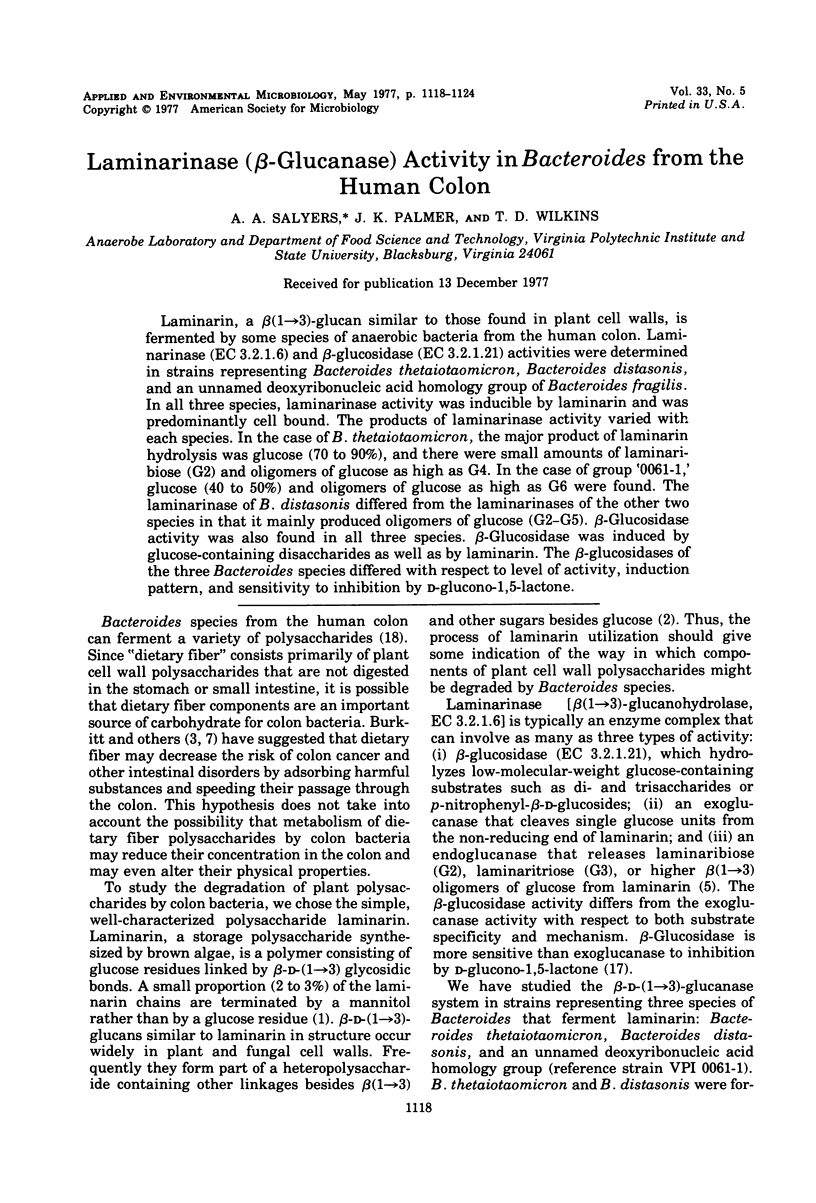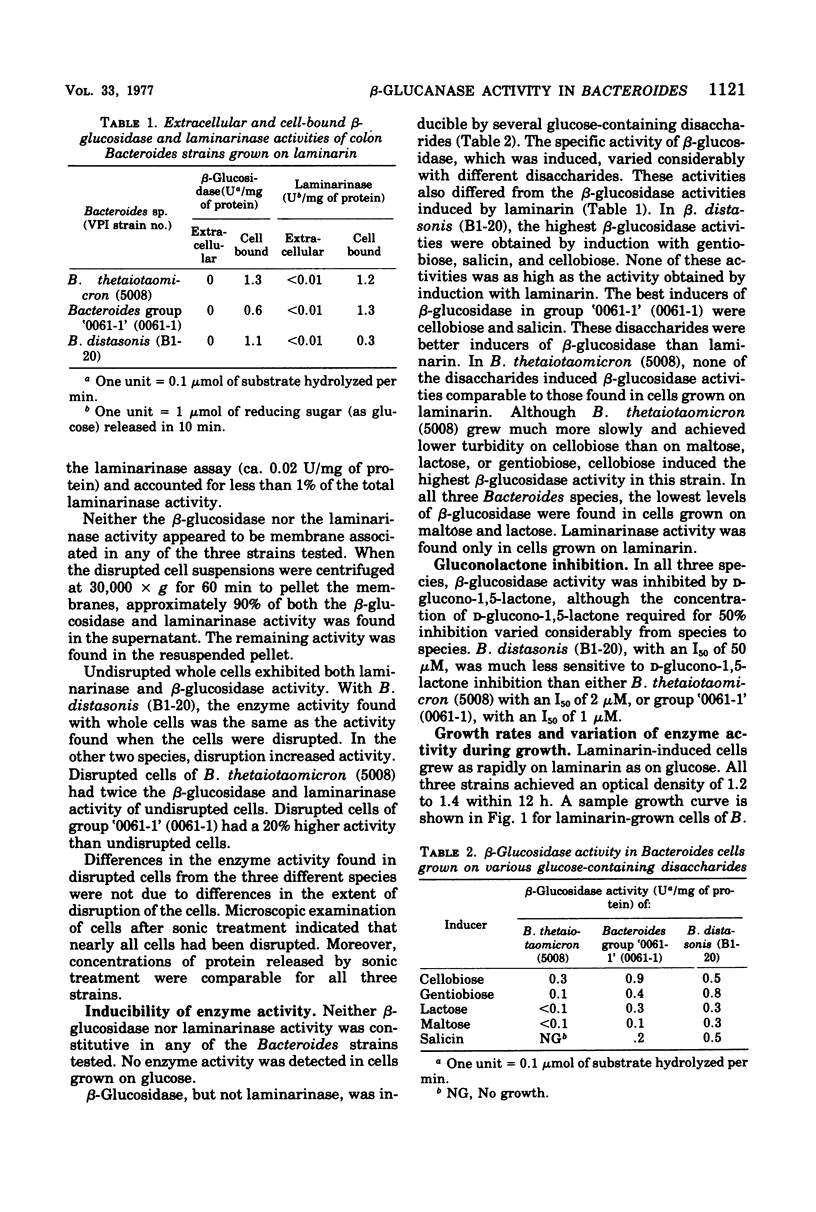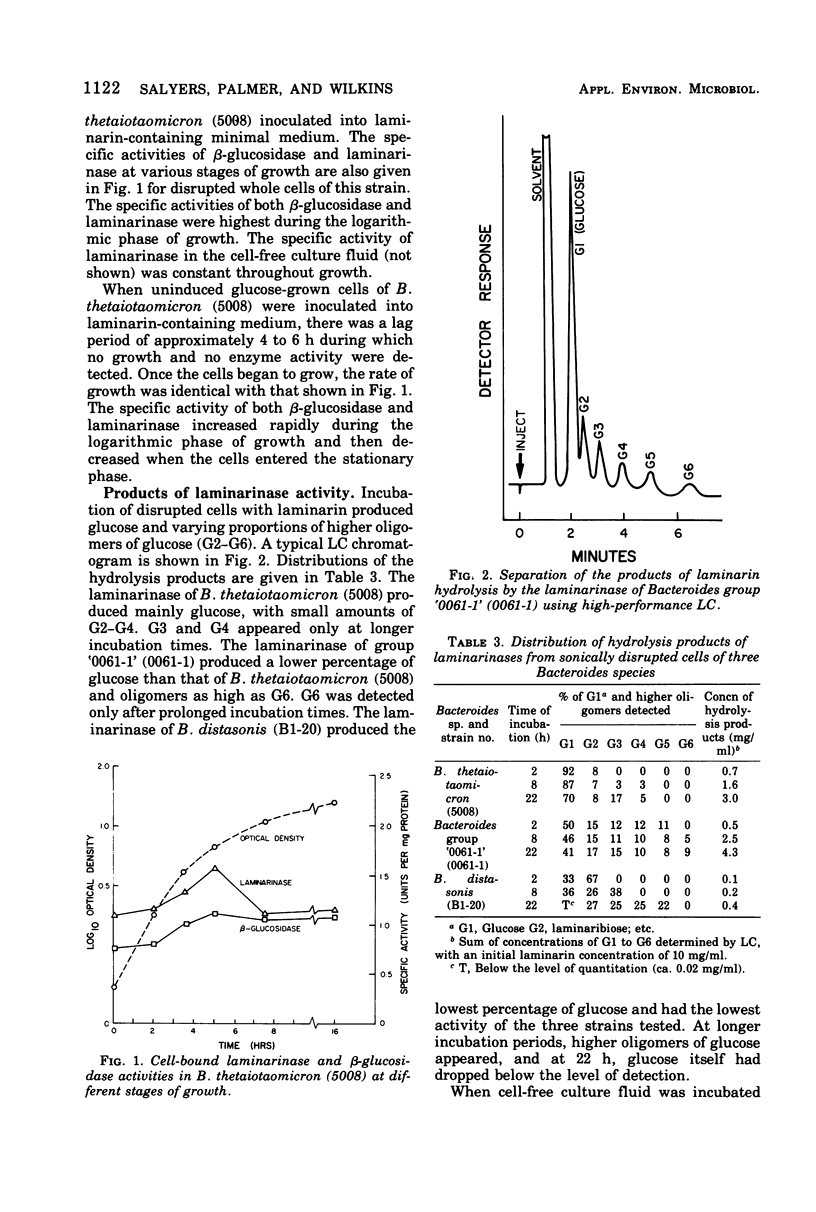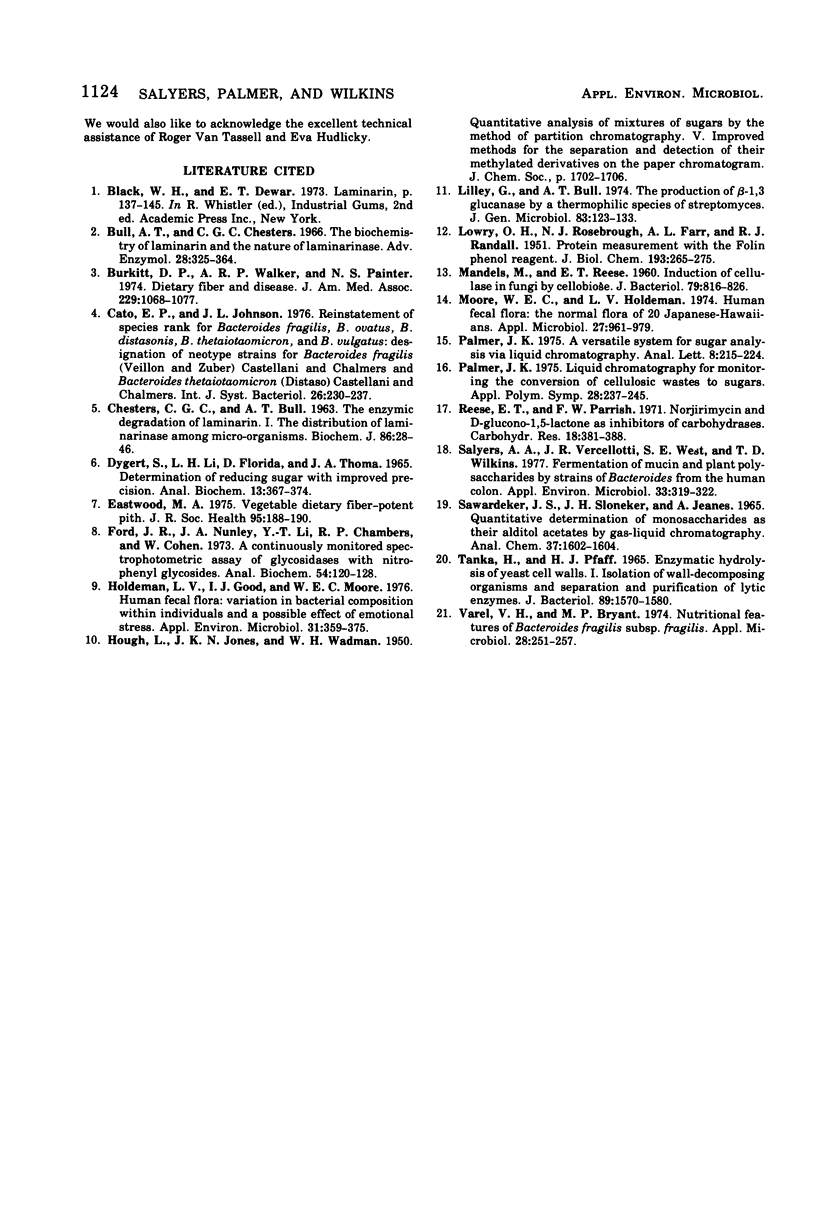Abstract
Laminarin, a beta(1 leads to 3)-glucan similar to those found in plant cell walls, is fermented by some species of anaerobic bacteria from the human colon. Laminarinase (EC 3.2.1.6) and beta-glucosidase (EC 3.2.1.21) activities were determined in strains representing Bacteroides thetaiotaomicron, Bacteroides distasonis, and an unnamed deoxyribonucleic acid homology group of Bacteroides fragilis. In all three species, laminarinase activity was inducible by laminarin and was predominantly cell bound. The products of laminarinase activity varied with each species. In the case of B. thetaiotaomicron, the major product of laminarin hydrolysis was glucose (70 to 90%), and there were small amounts of laminaribiose (G2) and oligomers of glucose as high as G4. In the case of group '0061-1,' glucose (40 to 50%) and oligomers of glucose as high as G6 were found. The laminarinase of B. distasonis differed from the laminarinases of the other two species in that it mainly produced oligomers of glucose (G2-G5). beta-Glucosidase activity was also found in all three species. beta-Glucosidase was induced by glucose-containing disaccharides as well as by laminarin. The beta-glucosidases of the three Bacteroides species differed with respect to level of activity, induction pattern, and sensitivity to inhibition by D-glucono-1,5-lactone.
Full text
PDF






Selected References
These references are in PubMed. This may not be the complete list of references from this article.
- Bull A. T., Chesters C. G. The biochemistry of laminarin and the nature of laminarinase. Adv Enzymol Relat Areas Mol Biol. 1966;28:325–364. doi: 10.1002/9780470122730.ch5. [DOI] [PubMed] [Google Scholar]
- Burkitt D. P., Walker A. R., Painter N. S. Dietary fiber and disease. JAMA. 1974 Aug 19;229(8):1068–1074. [PubMed] [Google Scholar]
- CHESTERS C. G., BULL A. T. The enzymic degradation of laminarin. 1. The distribution of laminarinase among micro-organisms. Biochem J. 1963 Jan;86:28–31. doi: 10.1042/bj0860028. [DOI] [PMC free article] [PubMed] [Google Scholar]
- Dygert S., Li L. H., Florida D., Thoma J. A. Determination of reducing sugar with improved precision. Anal Biochem. 1965 Dec;13(3):367–374. doi: 10.1016/0003-2697(65)90327-1. [DOI] [PubMed] [Google Scholar]
- Ford J. R., Nunley J. A., 2nd, Li Y. T., Chambers R. P., Cohen W. A continuously monitored spectrophotometric assay of glycosidases with nitrophenyl glycosides. Anal Biochem. 1973 Jul;54(1):120–128. doi: 10.1016/0003-2697(73)90254-6. [DOI] [PubMed] [Google Scholar]
- Holdeman L. V., Good I. J., Moore W. E. Human fecal flora: variation in bacterial composition within individuals and a possible effect of emotional stress. Appl Environ Microbiol. 1976 Mar;31(3):359–375. doi: 10.1128/aem.31.3.359-375.1976. [DOI] [PMC free article] [PubMed] [Google Scholar]
- LOWRY O. H., ROSEBROUGH N. J., FARR A. L., RANDALL R. J. Protein measurement with the Folin phenol reagent. J Biol Chem. 1951 Nov;193(1):265–275. [PubMed] [Google Scholar]
- Lilley G., Bull A. T. The production of beta-1,3 glucanase by a thermophilic species of streptomyces. J Gen Microbiol. 1974 Jul;83(0):123–133. doi: 10.1099/00221287-83-1-123. [DOI] [PubMed] [Google Scholar]
- MANDELS M., REESE E. T. Induction of cellulase in fungi by cellobiose. J Bacteriol. 1960 Jun;79:816–826. doi: 10.1128/jb.79.6.816-826.1960. [DOI] [PMC free article] [PubMed] [Google Scholar]
- Moore W. E., Holdeman L. V. Human fecal flora: the normal flora of 20 Japanese-Hawaiians. Appl Microbiol. 1974 May;27(5):961–979. doi: 10.1128/am.27.5.961-979.1974. [DOI] [PMC free article] [PubMed] [Google Scholar]
- Salyers A. A., Vercellotti J. R., West S. E., Wilkins T. D. Fermentation of mucin and plant polysaccharides by strains of Bacteroides from the human colon. Appl Environ Microbiol. 1977 Feb;33(2):319–322. doi: 10.1128/aem.33.2.319-322.1977. [DOI] [PMC free article] [PubMed] [Google Scholar]
- TANAKA H., PHAFF H. J. ENZYMATIC HYDROLYSIS OF YEAST CELL WALLS. I. ISOLATION OF WALL-DECOMPOSING ORGANISMS AND SEPARATION AND PURIFICATION OF LYTIC ENZYMES. J Bacteriol. 1965 Jun;89:1570–1580. doi: 10.1128/jb.89.6.1570-1580.1965. [DOI] [PMC free article] [PubMed] [Google Scholar]
- Varel V. H., Bryant M. P. Nutritional features of Bacteroides fragilis subsp. fragilis. Appl Microbiol. 1974 Aug;28(2):251–257. doi: 10.1128/am.28.2.251-257.1974. [DOI] [PMC free article] [PubMed] [Google Scholar]


